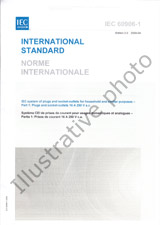We need your consent to use the individual data so that you can see information about your interests, among other things. Click "OK" to give your consent.

IEC/TS 62876-2-1-ed.1.0
Nanotechnology - Reliability assessment - Part 2-1: Nano-enabled photovoltaic devices - Stability test
Translate name
STANDARD published on 29.8.2018
The information about the standard:
Designation standards: IEC/TS 62876-2-1-ed.1.0
Publication date standards: 29.8.2018
SKU: NS-858576
The number of pages: 30
Approximate weight : 90 g (0.20 lbs)
Country: International technical standard
Category: Technical standards IEC
The category - similar standards:
Annotation of standard text IEC/TS 62876-2-1-ed.1.0 :
IEC TS 62876-2-1:2018 establishes a general stability testing programme to verify the stability of the performance of nanomaterials and nano-enabled photovoltaic devices (NePV) devices. These devices are used as subassemblies for the fabrication of photovoltaic modules through a combination with other components. This testing programme defines standardized degradation conditions, methodologies and data assessment for technologies. The results of these tests define a stability under standardized degradation conditions for quantitative evaluation of the stability of a new technology. The procedures outlined in this document were designed for NePV, but can be extended to serve as a guideline for other photovoltaic technologies as well.
We recommend:
Technical standards updating
Do you want to make sure you use only the valid technical standards?
We can offer you a solution which will provide you a monthly overview concerning the updating of standards which you use.
Would you like to know more? Look at this page.



 Cookies
Cookies
